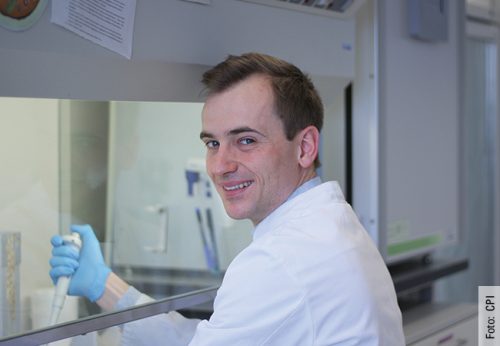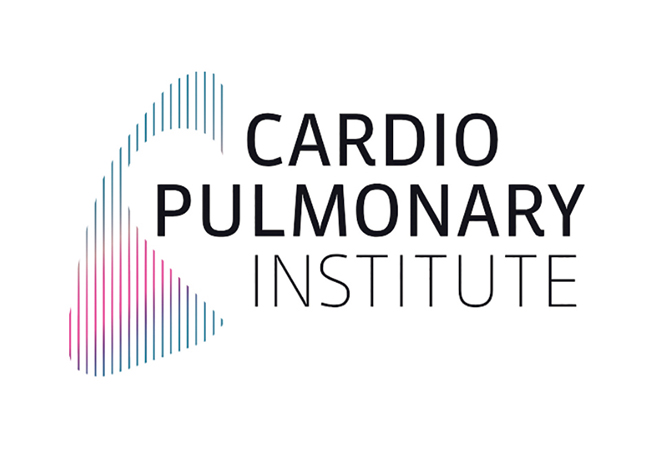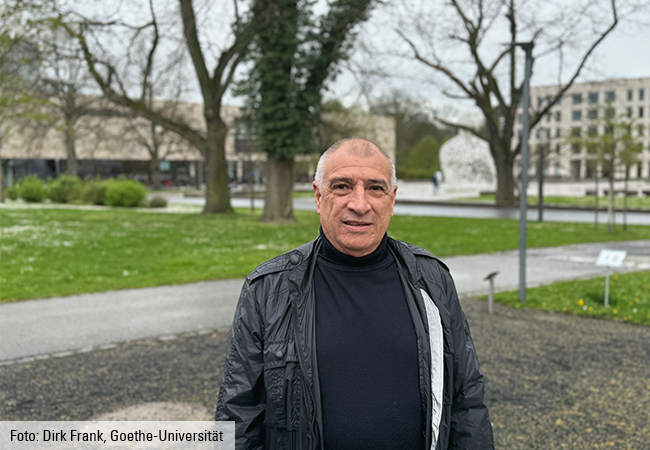Promoting young researchers at the Cardio-Pulmonary Institute (CPI) excellence cluster: Julian Leberzammer, a young medical doctor supervised by Prof. Andreas Zeiher and Prof. Stefanie Dimmeler, examines how macrophages respond to systemic inflammation.

Julian Leberzammer (30) is young and eager to learn. He belongs to a new generation of doctors who not only treat patients in hospital, but also want to conduct their own research to advance the development of treatment methods. Leberzammer is currently training to become an internist and cardiologist, and is especially interested in cardiac insufficiency. His dual career in hospital practice and research is supported by the Cardio-Pulmonary Institute (CPI) excellence cluster.
CPI offers young cardiologists and pulmonologists wishing to engage in scientific activities alongside their practical work a wide range of opportunities to realize their own research ideas. This and the search for new challenges and mentors are what attracted Julian Leberzammer to Frankfurt three years ago, and made him leave his home city of Munich, where he completed his schooling, first degree and a doctorate (with top marks). He found what he was looking for at CPI, where he is now supervised by CPI senior members Prof. Andreas Zeiher and Prof. Stefanie Dimmeler, alongside his working group leader Dr. Sebastian Cremer.
The Cardio-Pulmonary Institute
Cardiopulmonary diseases are the most frequent causes of death worldwide. The Cardio-Pulmonary Institute (CPI) comprises scientists and experts working on basic, clinical and translational research, who have joined forces to understand cardiopulmonary diseases and find new therapeutic approaches. Consisting of Goethe University Frankfurt, Justus Liebig University Giessen and the Max Planck Institute for Heart and Lung Research, the consortium is supported under the German Research Foundation’s Excellence Strategy. CPI will submit a full proposal for the new round of the excellence competition of the German federal and state governments. www.cpi-online.de
Prof. Stefanie Dimmeler’s Institute of Cardiovascular Regeneration (ICR) has close links with Frankfurt University Hospital’s Department of Cardiology and Angiology, where Leberzammer works as a junior doctor under Prof. David M. Leistner, most recently in the emergency room and the intensive care unit. In addition to being very familiar with severe disease cases, Leberzammer also knows about the limits of modern medicine. “As a clinician I encounter diseases and establish connections between things every day, which I would like to investigate in the lab in order to understand them better.” This was how he became interested in the role of macrophages during the development of cardiac insufficiency and the interactions between cardiovascular diseases and bacterial and viral pneumonia.
Cardiac insufficiency: a common condition
Cardiovascular diseases are doubtless an important field of research, not least because they are among the most common causes of death worldwide. They include cardiac insufficiency, when the heart is no longer able to pump enough blood through the body – a disease that affects millions of people and severely reduces their quality of life. Patients experience shortness of breath, edema in the legs, fatigue and physical weakness. The risk of cardiac insufficiency increases with age, underscoring the need for action in an aging society like ours. Risk factors include a fat-rich diet, high blood pressure as well as pulmonary infections like SARS-CoV-2, which can trigger an inflammatory response. Julian Leberzammer is particularly interested in “how macrophages and their precursors in the heart, blood vessel walls and the blood react to systemic inflammation.”
CPI places a special focus on this major role played by the interactions between various organ systems such as the heart and lungs, also because communication between the organs is not yet fully understood. While most of the cardiovascular research takes place in Frankfurt, Prof. Susanne Herold’s team in Giessen investigates diseases of the lung. Beyond that, CPI’s network spans several partner institutes, allowing expertise, techniques as well as financial and intellectual resources to be pooled. Since many scientists are highly specialized and focused in their particular field, the effective bundling of these resources can help successfully realize even very complex projects. Such cooperation arrangements also benefit Julian Leberzammer, who emphasizes that “all patient-relevant questions should be answered by a team.”
Macrophages
White blood cells that constitute a subset of phagocytes and are part of the immune system. Function: eliminating microorganisms.
Angiology
A specialty within internal medicine concerned with diseases of the blood vessels
RNA
Ribonucleic acid
Interventional cardiology
Catheter-based treatment of structural cardiac diseases
Learning both with and from one another is also central to the CPI Academy. Following their medical exams, young doctors have the opportunity to register as members for 12 years, as long as they can provide the names of two high-level researchers to act as their mentors. CPI Academy members can attend training seminars and courses, including on subjects like statistics, science communication, entrepreneurship or image processing. There are also regular lectures by leading scientists from all over the world, who report on their research and career paths, and which are popular among many young scientists keen to exploit the opportunities of learning directly from these great role-models.
One technique Julian Leberzammer learned while conducting his research here is “single-cell RNA sequencing”, a method, he says, that allows “a large number of individual cells to be analyzed very precisely, down to what is happening in each individual cell.” Far from being uniform, cell structures in human organ tissue instead occur as complex cellular mixtures. Applying single-cell RNA sequencing helps Leberzammer enormously in understanding the complicated processes that occur during inflammation responses and later result in cardiac insufficiency. “The technique can be used, for instance, to explore which cell programs are activated in various types of cells as cardiovascular diseases develop. As such, we look at cells from hearts with different kinds of cardiac insufficiency, and compare them to healthy hearts.” The work, for which Julian Leberzammer has received a CPI start-up grant, is aimed at developing anti-inflammatory treatment options for specific forms of cardiac insufficiency. In addition to serving as recognition of his principle, the funds also enable him to finance personnel, expensive laboratory materials and analytical equipment.
Lab rotation
Thanks to the funding from the INDEEP Clinician Scientist Program of Goethe University’s Faculty of Medicine and the German Research Foundation (DFG), Leberzammer is currently taking time out from his hospital work and focusing exclusively on his research. He is already looking forward to returning to clinical cardiology and applying his newly acquired knowledge, going “from bedside to bench and back”, so to speak. This term is used to describe the lab rotation, which means he can spend one year doing research full-time and another two years half-time with Prof. Dimmeler at the Institute of Cardiovascular Regeneration. “This is something I was previously only able to do for shorter periods. It’s very helpful to be able to focus solely on research for a longer period,” Leberzammer says.
The combination of basic, translational and clinical research is a central pillar in the training young researchers receive at CPI, which also attaches special importance to helping the upcoming scientists learn to take decisions independently, with a view towards preparing them for the managerial tasks they will face later in their careers.
Leberzammer’s work has already been crowned with success. He has been nominated for the German Cardiac Society’s (DKG) Rudi Busse Young Investigator Award for experimental cardiovascular research 2024, and presented his research results at the DGK Congress in Mannheim in early April. “It’s a challenge to describe basic scientific research to a varied audience of (practice-based) cardiologists and scientists in a way that is interesting and comprehensible,” says Leberzammer. “But I’m delighted to have the honor of presenting our team’s work at the DGK Congress 2024 in Mannheim.”
Laura Fräulin with Daniela Daume













